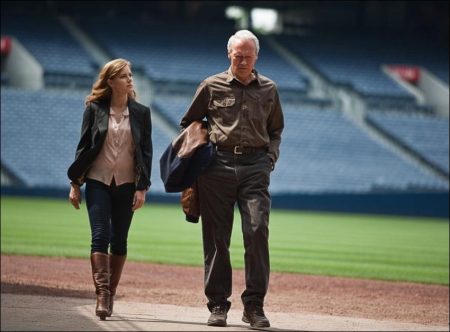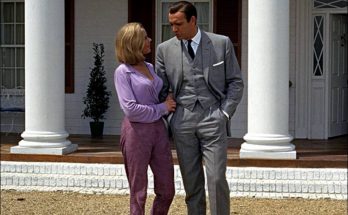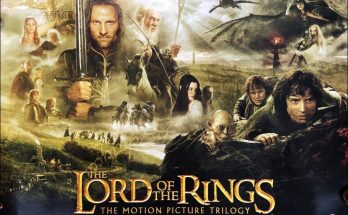Trouble with the Curve: Re-evaluating priorities of lifeb Gus Lobel (Clint Eastwood) has been one of the best scouts in baseball for decades, but, despite his efforts to hide it, age is starting to catch up with him. Nevertheless, Gus, who can tell a pitch just by the crack of the bat, refuses to be benched for what may be the final innings of his career. He may not have a choice. The front office of the Atlanta Braves is starting to question his judgment, especially with the country’s hottest batting phenom on deck for the draft.
The one person who might be able to help is also the one person Gus would never ask: his daughter, Mickey (Amy Adams), an associate at a high-powered Atlanta law firm whose drive and ambition has put her on the fast track to becoming partner. Against her better judgment, and over Gus’s objections, Mickey joins him on his latest scouting trip to North Carolina, jeopardizing her own career to save his. Forced to spend time together for the first time in years, each makes new discoveries, revealing long-held truths about their past and present that could change their future.
“‘Trouble with the Curve’ is a story about how we deal with what life throws at us,” describes director/producer Robert Lorenz. “It has characters in whom we can all see a bit of ourselves, reaching those moments in life when we are faced with re-evaluating priorities: the importance we put on our careers, our friendships and our family.”
At the center of the story are a father and daughter whose lives have taken them in opposite directions. Even when they’re together, they are worlds apart. But now, circumstances are forcing them to face their differences on common ground.
“In any family, even when things get tough, there are always ties that connect you,” says the film’s star and producer Clint Eastwood. “You just have to find a starting point to begin to close the gap.”
While Lorenz is an award-winning producer, the film marks his directorial debut. The former assistant director, who segued into producing Eastwood’s movies, says he always intended to direct. “It was just a matter of finding the right project at the right time,” Lorenz states. “I felt the story had broad appeal, a lot of humor, with really great characters and interesting relationships, and I could easily visualize what I would do with it as I read it. The fact that it had a great role for Clint and he was interested in playing it was way more than I could have hoped for.”
“Rob and I have worked together for almost 20 years now,” Eastwood says. “We’ve talked about him directing over the years, so when he showed me this script, I thought it was a perfect opportunity. I had no doubt he’d do a terrific job, and he absolutely did.”
Eastwood plays Gus Lobel, a man nearing the end of a long career who is too proud, or too stubborn, to reveal the secret that his eyes are no longer as sharp as his instincts. And while those closest to him aren’t exactly sure what’s wrong, they know that something is-something that, for his daughter, Mickey, is worth dropping everything for. Even if she’s going to have to fight him every step of the way.
Lorenz adds, “In any other relationship, Mickey showing up to help, even if it’s unexpected, would be a good thing. But Gus just can’t see it that way.”
Amy Adams, who plays the role of Mickey, says that there’s universality to Mickey’s feelings about her dad. “Daughters always want the approval of their fathers. So, naturally, Mickey wants Gus’s attention; she wants him to be proud of her, but he, like many dads, has a hard time conveying that. Over time, she’s built up a wall and things between them have become contentious, to say the least.”
That wall has extended to her love life as well, and that, combined with her long work hours, have made it hard for Mickey to take romantic associations to the next level. However, her initial disinterest doesn’t discourage Johnny Flanagan, who finds himself immediately attracted to her. Like both Gus and Mickey, the former baseball player is in a transitional phase of life.
Justin Timberlake portrays the ex-pitcher, and loved how interwoven the relationships were. “In a twist of fate, Gus had scouted Johnny when he was a high school phenom. Now, having blown out his arm pretty early in his career, he’s trying his hand at scouting, which is how he comes in contact with Gus again…and where he meets Mickey.”
Producer Michele Weisler, whom Lorenz has known for many years, had brought him Randy Brown’s screenplay. “The story really resonated with me,” Weisler recalls. “We all have relationships with our parents, of course, and this one had a lot of dramatic weight-a stoic, emotionally unavailable single father and a resentful daughter who never understood why he’s kept her at arm’s length. But it also had enough levity to feel very real. It may be Gus’s story, but it’s also easy to see things from Mickey’s point of view.”
Though the story evolved over time, for first-time feature film writer Brown, the main character was always “a crotchety old guy who was kind of being phased out by the young blood and the new technology. It’s happening every day in our country, and not just in baseball. I wondered how that must make someone feel, being pushed out to make room for someone else climbing the ladder,” he says.
“These characters all come together at a time of significant change for each of them,” Lorenz says. “They are all on a journey and have to discover something about themselves in order to move beyond the place they are in their lives and onto the next thing, whatever that may be.”
Related Link: View the Full Production Notes for Trouble with the Curve
Views: 73




